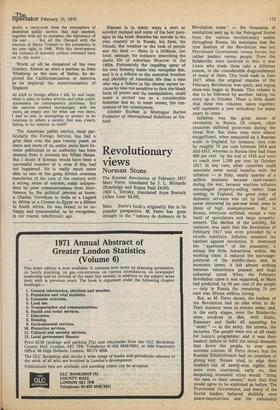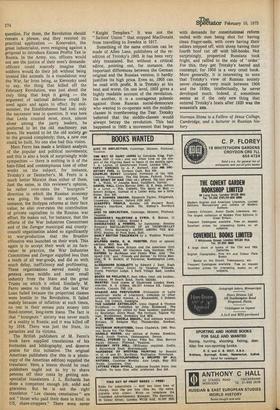Revolutionary views
Norman Stone
The Russian Revolution of February 1917 Marc Ferro, translated by J. L. Richards (Routledge and Kegan Paul £4.95).
1905 L. Trotsky, translated Anya Bostock (Allen Lane £4.95).
Marc Ferro's book's originality lies in its popular perspective. M. Ferro has gone straight to the " cahiers de doleance de la Revolution russe " — the thousands of resolutions sent up to the Petrograd Soviet from the various revolutionary bodies throughout Russia. He maintains that the true dualism of the Revolution was not Provisional Government versus Soviet, but rather leaders versus people. Even the Bolsheviks were involved in this: it was Lenin who made them take a different course, to the considerable disgruntlement of many of them. This book ends in June 1917, when the original impulse of the February Revolution was spent, and, raging class-war began in Russia. This volume is due to be followed by another, taking the story up to October. There is little doubt that these two volumes, taken together, will represent a new orthodoxy for many years to come.
Inflation was the great motor of revolution in Russia. Of course, other countries suffered price-rises during the Great War. But these rises were almost insignificant, when measured on a Russian scale: in England, for instance, they rose by roughly 70 per cent between 1914 and mid-1917, whereas in Russia they had risen 400 per cent by the end of 1916 and were to reach over 1,100 per cent by October 1917. In any case, other countries could associate some social benefits with the inflation — in Italy, nearly quarter of a million peasants became land-owners during the war, because wartime inflation encouraged property-selling rather than renting; in England, the great army of domestic servants was cut by half, and never recovered its pre-war level, even in times of high unemployment. But in Russia, everyone suffered, except a tiny band of speculators and large property owners. The decline of the nobility, for instance, was such that the Revolution of February 1917 was even preceded by a revoite nobiliaire. Inflation smashed the barriers against revolution. It destroyed the " apartness " of the peasantry; it ruined the little hierarchies within the working class; it reduced the patronage potential of the middle-class; and, in economic terms, it left almost nothing between subsistence peasant and huge industrial cartel. When the February Revolution came it was supported, as Marx had predicted, by 90 per cent of the people — only in Russia the remaining 10 per cent was fifteen million strong.
But, as M. Ferro shows, the leaders of the Revolution had no idea what to do. Their instincts were to restore order; and, in the early stages, even the Bolsheviks were involved in this, with Stalin, Kamenev and Gorki all appealing for " order " — in the army, the streets, the factories. The people were not at all ready for Lenin's programme: and it was their leaders' failure to fulfil the initial demands that drove the people to ever more extreme courses. M. Ferro shows that the Russian Establishment had no intention of giving way. Bosses tried, to edge their workers out of newly-won rights; they were even convinced, early on, that deepening economic crisis would "bring the men to their senses," such that they would agree to be exploited as before. The Provisional Government, and many of the Soviet leaders, behaved shabbily over peace-negotiations and the nationality question. For them, the Revolution should remain a phrase, and they resisted its practical application — Konovalov, the great industrialist, even resigning against a proposal to introduce Excess Profits Tax in Russia. In the Army, too, officers would not see the justice of their men's demands: officers could scarcely imagine that soldiers would do their job without being treated like animals. In a roundabout way the War, far from being, as Kerensky used to say, the thing that killed off the February Revolution, was just about the only thing that kept it going — the argument of national defence could be used again and again to effect. By mid summer, the Establishment had lost: only the successor was in question. It was here that Lenin counted most, since, almost alone among the party leaders, he preferred to let the old machinery run down. He wanted to let the old society go to the ground completely; then, a new one could, be built. No one else had this vision. Marc Ferro has made a brilliant analysis of the popular and political movements; and this is also a book of surprisingly wide sympathies — there is nothing in it of the hate-filled and contemptuous tone of other works on the subject, for instance, Trotsky's or Deutscher's. M. Ferro is a much better Marxist than either of them. Just the same, in this reviewer's opinion, he rather over-rates the "bourgeois " direction in which the Russian economy was going. He tends to accept, for instance, the Stolypin reforms at their face value; he also over-rates the contribution of private capitalism to the Russian war effort. He makes out, for instance, that the efforts of the War Industries Committees and of the Zemgor municipal and countycouncil organisation added so significantly to war-production that the Brusilov offensive was launched on their work. This again is to accept their work at its facevalue: in practice, the War Industries Committees and Zemgor supplied less than a tenth of all war-goods, and did so with much delay, inefficiency and profiteering. These organisations served mainly to protect some middle and most small industry from the State and the great Trusts on which it relied. Similarly, M. Ferro seems to think that the last War Loan failed because the propertied classes were hostile to the Revolution. It failed mainly because of inflation: at such times, no one in their senses puts money into fixed-interest, long-term loans. The fact is that " bourgeois " society was never much of a reality in Russia; and it was killed off by 1916. There was just the State, its parasites and its victims.
The British publishers of M. Ferro's book have supplied translations of his footnotes and bibliography, and deserve praise for this initiative. The original American publishers (for this is a photocopy of the American edition) supplied the translator. Here a lesson should be read: publishers ought not to try to shave pennies off their costs by getting nonspecialist translators. J. L. Richards has done a competent enough job, solid and graceless. But he is not the right translator. " Les classes censitaires " are not "those who paid their dues in kind: in US, share-croppers." There were never "Knight Templars." It was not the "Sailors' Union" that stopped MacDonald from travelling to Sweden in 1917.
Something of the same criticism can be made of Allen Lane, publishers of the reedition of Trotsky's 1905. It has been very ably translated. But without a critical editor, pointing out, for instance, the important differences between the German original and the Russian version, it hardly justifies its high price. Even so, 1905 can be read with profit. It is Trotsky at his best and worst. On one level, 1905 gives a highly readable account of the revolution. On another, it is a courageous polemic against those Russian social-democrats who wanted to co-operate with the middleclasses in overthrowing the Tsar. Trotsky believed that the middle-classes would always betray the revolution. This had happened in 1905: a movement that began with demands for constitutional reform ended with men being shot for having clean finger-nails, with cows having their udders snipped off, with sheep having their fourth hoof cut off with bill-hooks. Not surprisingly, propertied Russians took fright, and rallied to the side of 'order.' For this, they get Trotsky's hatred and contempt; for 1905 is a very cruel book. More generally, it is interesting to note that Trotsky's view of Russian society never changed very much between 1908 and the 1930s; intellectually, he never developed much. Indeed, it sometimes seems as if the only new thing that entered Trotsky's brain after 1920 was the assassin's axe.
Norman Stone is a Fellow of Jesus College, Cambridge, and a lecturer in Russian history



































 Previous page
Previous page